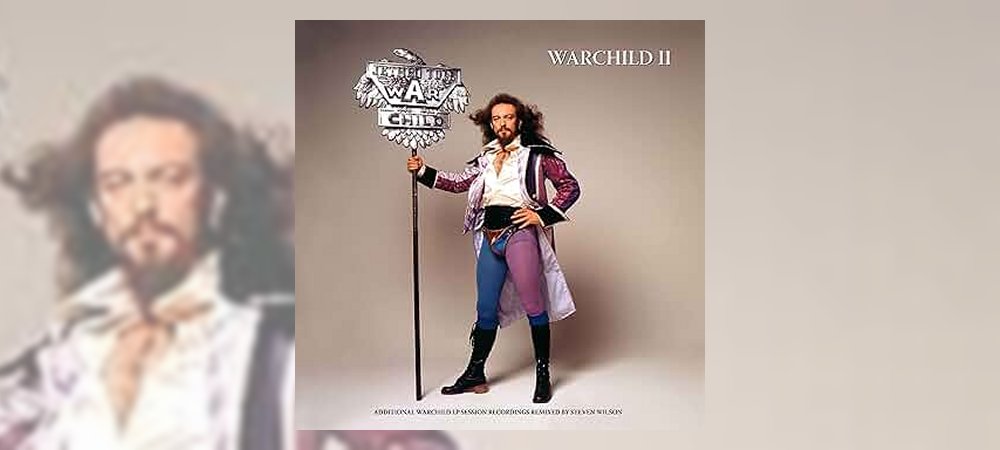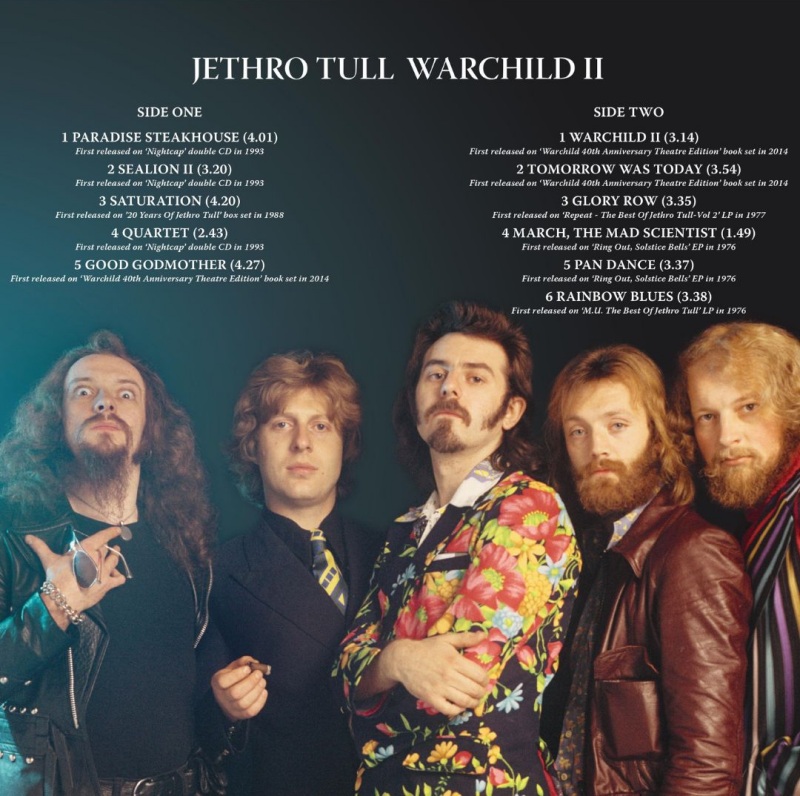My first introduction to Jethro Tull was listening to my older brother playing his copy of Aqualung when I was about 10 years old. And in my mid teens I got to see 50 minutes worth of the band’s Madison Square Garden show on The Old Grey Whistle Test, and later on borrowed from a friend a copy of the band’s then current live album, Bursting Out. Bizarrely, that’s about as far as my relationship with Tull ever progressed. That is until Covid struck; lockdowns ensued, and I decided to hunt down the 40th Anniversary Edition of Aqualung to hear what it sounded like after Steven Wilson’s remixing. Amazingly, I fell in love with it far more than previously, and with time on my hands I decided to track down and work my way through the entire ’60s and ’70s Tull back catalogue, digging deep into all the 40th anniversary editions that had been given that glorious Steven Wilson re-polishing.
The reason I’m giving you this background information is because I never grew up listening to the vast majority of classic Tull albums. I only absorbed them by listening to them in their ‘full’ reissued form, complete with all the bonus tracks from the same associated recording sessions. In other words, I am as ‘equally’ familiar with all the bonus tracks as I am with the original album content. And as every single track on this new album was included in the 40th Anniversary Theatre Edition of War Child, then I already knew them all very well. What you have in this particular collection, titled War Child II, are the eleven tracks that were not used back then but were recorded during those exact same sessions that produced the original War Child album.
Some of these were released on later compilations and re-issues over the years; three on the Nightcap album, two on the Ring Out the Solstice Bells EP, one from M.U, one from Repeat, and one from the 20 Years of Jethro Tull box set. The remaining three tracks were unearthed and first used for the marvellous 2014 40th Anniversary Theatre Edition. And in fact all eleven of these tracks made up the first eleven numbers on the bonus disc included in the 40th Anniversary remix, as well as several orchestral pieces intended for the ditched War Child movie, plus 5.1 surround sound versions of every piece of remixed material from the entire project.
So why the need to release this again? Well, if you are a vinyl purist and weren’t interested in the CD or DVD versions of the 40th Anniversary Edition, then now is your opportunity to add those missing tracks to your collection. With a total running time of around 39 minutes, this means that it fits nicely on two sides of vinyl and will still give a superb audio reproduction. It also means that instead of hunting through your numerous Tull records to root out the majority of these hidden gems, you now have them all together in one collection. And of course, it makes the absolute perfect companion to the original War Child album, with the contents all being recorded around that same era.
Of the eleven tracks featured, two are versions of songs already on the War Child album; the title track and Sealion. The first is a different edit and mix, the second a completely alternative imagining of the song entirely. Two more are instrumental numbers, while the remaining seven are complete songs that for some reason were omitted when the final track listing was assembled for War Child back in 1974. The obvious reasoning back that would have been lack of space, as the original double-album project was abandoned (as well as the movie), and it was streamlined down to a regular single album format. Out of those missing seven songs, in my estimation two or more of them could have comfortably fitted with the content on the original album, as they have similar superb song-writing qualities.
This new release opens up with Paradise Steakhouse, which happened to be among the first songs the band recorded when they started the War Child sessions in early December 1973. It’s a great tune with a nice bouncy tempo, excellent catchy chorus, and a reoccurring theme with flute and lead guitar carrying the melody. The lyrics are fun too, with promises of a heaven-like existence when you visit the steakhouse to feast on the meaty delights on offer. This was originally issued on the unreleased and outtakes compilation album Nightcap in 1993.
Next up is Sealion II, and it’s a very different recording of the song that appeared on the original War Child album. It still has the same strange discordant opening and refraining melody lines, and a similar mid-section too, but apart from that this feels like a completely different song altogether. No singing, just spoken word, and the repeating phrase of “Cecil the Sealion” during the choruses. This version has a much darker and unnerving feel, with an almost sinister under-pinning vibe. Recorded during the same session that delivered Sealion in early January 1974, and again first appearing on the Nightcap album. It’s great to hear the song in this very alternative form, but for me the one that appeared on War Child was clearly the better choice.
Saturation is next. A slower, more broodingly paced number, but it still bears all the classic Jethro Tull hallmarks that make it instantly recognisable as being them. Not as memorable as some of the other selections on this record, it’s fairly apparent why it wasn’t considered good enough in comparison to the tracks that were actually chosen for the War Child album. But I’m still glad to see it here, and deservedly so among the other recordings from the same era. Recorded mid-December 1973 and first released on the 20 Years of Jethro Tull box set in 1988.
Quartet is suitably track 4. An instrumental number, it starts off with a distinct swing/jazz-club vibe, featuring upright bass, saxophone, and drums played with brushes. Then enters a harpsichord, strings, flute and glockenspiel to take it in another direction. As it merges into the next section you hear a church-style organ and choral vocals take over the main melodies, which abruptly stop to be replaced by various synths, rounding off this brief ditty which only clocks in at a little over two minutes and forty seconds. Although Ian Anderson is often credited as the main songwriter, I’m guessing that their arranger Dee (David) Palmer had an awful lot to do with this particular number too. I think this was probably originally slated to be a part of the score for the movie soundtrack, yet eventually did get its first appearance on the Nightcap album.
And now my favourite song on the first side of this album, Good Godmother. Recorded in mid-December 1973, it’s a fabulously catchy tune with a lovely bounce to it, containing a quirky refraining melody that sounds like it came from a ’70s children’s TV show. I absolutely love this one, and I’m stunned that it remained in the vault until it was finally put out as part of the 40th Anniversary edition just nine years back. For me, it’s one of the highlights from this group of songs, and in my eyes as good as anything on the War Child original release. It just baffles me as to why it took 40 years to finally be given a public release, yet I’m very glad it’s featured here. Probably one their most commercial tunes, falling into similar pop territories as Bungle in the Jungle from War Child.
Side two starts with the title track, War Child II, which is essentially a different edit from the one that appeared on the original War Child release. A much shorter version due to the omission of the familiar air-raid sirens, explosions, gun-fire… and chinking tea cups. The piano and saxophone introduction is halved in length and the first verse starts fairly quickly in the proceedings. The main song structure remains quite similar, so overall it doesn’t really feel vastly different. The first obvious change is the introduction of some accordion during the first verse. This version seems a little less layered with instrumental overdubs, etc., and also doesn’t have the explosions during the fade-out. Other than that it’s not hugely different at all, except for having no intro or closing sound FX. First released on the 40th Anniversary Edition.
Next up is probably my favourite song on the album, Tomorrow Was Today, recorded in late February 1974. It starts off with acoustic guitar, piano, flute and bongos during the intro, which is not too dissimilar from something you’d hear during the band’s Stand Up/Benefit era. But it doesn’t take long for the main striding guitar lick to kick in, which forms the verses and choruses. For me, it’s the way the tempo changes mid-way through, making the tune take a total change of direction, and then you get some fabulous accordion swells coming in. I love that curveball approach to the song, which makes it jump out as something that probably should have been on the original War Child album. Once again, this was surprisingly left in the vaults and not made public until the 40th Anniversary Edition was released.
Glory Row is another song to feature Ian Anderson’s experimentation during this era with alto saxophone, turning out to be another string to his bow among his vast multi-instrument capabilities. During the closing section it even has both flute and sax carry the main melody line. Accordion features on this track too, as well as some nice slide guitar passages, and even some mandolin. It’s a decent track, perhaps outshone by some of the other inclusions in this package, yet still very worthy of its place. First released on the compilation Repeat: The Best of Jethro Tull, Vol.2 in 1977.
March, The Mad Scientist is very stripped back with a couple of acoustic guitars, upright bass, and some keyboards finally coming in for the second half. Lasting a mere 1 minute and 48 seconds, it is the shortest song on this album. However, its brevity does not diminish its importance as it really is one of those lovely gems of a tune. This wasn’t kept on the shelf for too long, and was released a couple of years later after its recording, as part of the Ring Out the Solstice Bells EP.
Pan Dance is totally instrumental. Again, it’s highly likely that it was intended for the War Child movie soundtrack, as apart from acoustic guitar, flute and occasional glockenspiel, the main instrumentation is a string section. Not an instantly catchy tune, but definitely a grower, it sits a little out of place with the rest of the material on this collection as it’s not really a band tune at all, and once more very likely a working collaboration between Anderson and their regular music arranger Dee Palmer. However, as it comes from the same era as all these other recordings, then I guess it has earned its place here. Another track first released on the Ring Out the Solstice Bells EP in 1976.
And the final track on side two is Rainbow Blues. It starts off as a traditional blues song with its slow pace and styling during the intro, but it soon picks up in tempo and comes into its own as a fine quality Tull song. The electric guitar takes a bit of a back-seat during the choruses to make space for the string arrangements, which feature quite prominently at times, but the guitar comes back with a vengeance at the end as it closes with the same slow blues vibe that it opened with. Another very decent song, and an apt way to finish off this collection. First released on the compilation M.U: The Best of Jethro Tull in 1976.
I really enjoyed rediscovering this batch of songs, listening to them purely on their own and not, as I have often done, playing them directly after just listening to the main War Child album. Some people might view these as outtakes, and in some way think them inferior to the tracks that actually made it onto the 1974 album release. But I see them as just as essential, as they complete the story of what Jethro Tull were doing during those particular recording sessions. The ’70s were a glorious time for the band, and this album features what many think of as the classic line-up, with Anderson, Martin Barre, Barriemore Barlow, John Evan and Jeffrey Hammond. The songs featured here do indeed make a worthy companion album to War Child, even if it has taken nearly 50 years for them to be released together like this in vinyl form.
Seemingly, Ian Anderson has had some involvement with this project and personally chosen the running order for these songs, but apart from that these are all the exact same remixes that Steven Wilson did for the 40th Anniversary release of War Child, which of course makes the sound quality absolutely fantastic. Wilson has an incredible ear for sound, and an amazing gut instinct for how to get the best out of old analogue multi-track recordings, so rather than trying to radically alter these in any way, he sets about his job with the same mindset as an art gallery restorer, and he lovingly clears away the dirt and grime to make these old masters shine once more in all their splendid glory. And just as much loving attention to detail has been bestowed upon this collection as was given to the main War Child album itself.
For any Jethro Tull fan that has collected all the classic albums on vinyl, this is a no-brainer decision to also add it to your collection. It comes in 140 gram black vinyl, complete with brand new cover photo (taken from the same photo session as the main LP). The back sleeve shot comes from a similar era, complete with sleeve notes, inner sleeve photo from the War Child cover sessions, and all lyrics are featured too. It even has the classic green and red Chrysalis ’70s record label on the vinyl, which I absolutely love. War Child II has been released purely in vinyl form, and there is also a limited edition coloured blue vinyl version available too. There is nothing on here that has not been previously released, but it is a cool compilation of some fine songs, beautiful audio quality, and will look awesome among your other classic Tull vinyl LPs. Also, this new cover features Anderson’s infamous resplendent codpiece, which surely is good enough reason alone to purchase it! ( 😉 )
TRACK LISTING
Side 1
01. Paradise Steakhouse (4:01)
02. Sealion II (3:20)
03. Saturation (4:20)
04. Quartet (2:43)
05. Good Godmother (4:27)
Side 2
06. War Child II (3:14)
07. Tomorrow Was Today (3:54)
08. Glory Row (3:35)
09. March, The Mad Scientist (1:49)
10. Pan Dance (3:37)
11. Rainbow Blues (3:38)
Total Time – 38:38
MUSICIANS
Ian Anderson – Vocals, Flute, Acoustic Guitar, Alto, Soprano & Sopranino Saxophones
Jeffrey Hammond-Hammond – Bass Guitar, Acoustic Bass, Lead Vocals (track 2)
Barriemore Barlow – Drums, Glockenspiel, Marimba, Percussion
Martin Barre – Electric & Spanish Guitar
John Evan – Organ, Piano, Synthesiser, Piano Accordion
Patrick Halling – Orchestra Leader
Orchestra – Philomusica Of London
David Palmer – Orchestrations
ADDITIONAL INFO
Record Label: Parlophone Records Ltd.
Country of Origin: U.K.
Date of Release: 24th November 2023




